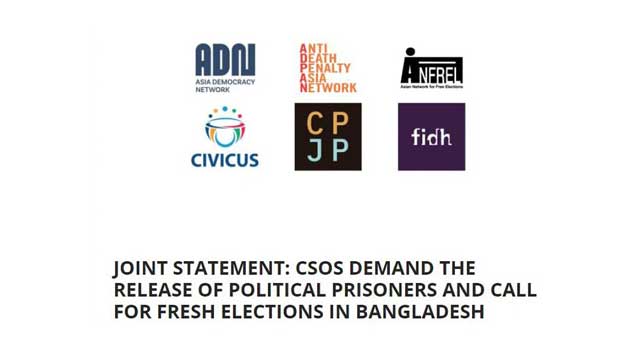Six international civil and human rights groups in a joint statement on Friday called on Bangladesh authorities to hold a free, fair, participatory and inclusive fresh election under a neutral interim government, and also called for releasing all political prisoners held over the months.
They also questioned the legitimacy of the 41.8 per cent voter turnout’s official figure on January 7 elections, reported by the Election Commission, saying that reports and eyewitness accounts from various polling stations across the country paint a contrasting reality.
‘We strongly call upon the government of Bangladesh to take steps to hold a free, fair, participatory, and inclusive fresh election, with political consensus from all parties, under an impartial election management body and under a neutral interim government administration,’ said the joint statement.
Asian Network for Free Elections, better known as ANFREL, World Alliance for Citizen Participation, better known as CIVICUS, International Federation for Human Rights (FIDH), Asian Democracy Network, Capital Punishment Justice Project in Australia and Anti-Death Penalty Asia Network jointly made the statement.
They said that the elections were neither genuine nor competitive and raised questions about its adherence to democratic principles and international election standards.
‘Numerous reports and evidence point to widespread irregularities in the lead-up to and on the election day, including voter suppression and manipulation of results, which severely undermine the fundamental principles of democracy.’
The citizens of Bangladesh deserve an electoral process that is transparent, accountable and reflective of their collective will, and one that is respected and trusted by all parties, the statement read.
‘We underscore the importance of a free and fair election as a cornerstone of participatory governance.’
The deliberate silencing of opposition voices and curbing of political dissent leading up to the polls were alarming, the statement said, adding, law enforcement agencies adopted an unsettling approach, apprehending opposition figures and advocates nationwide.
They also called upon the government of Bangladesh to release all political prisoners who have been imprisoned under fabricated cases simply for political dissent and to foster a civic space that allows individuals and groups to freely exercise their rights to freedom of expression, association and peaceful assembly.
‘There must also be independent investigations into: the excessive use of force by law enforcement agencies against protesters; the custodial deaths of opposition leaders and activists; and the attacks on journalists in the lead-up to the election and on election day.’
The rights to freedom of association, peaceful assembly and expression were selectively guaranteed to pro-government entities and individuals.
It said that the main opposition parties and alliances, including the Bangladesh Nationalist Party, Left Democratic Alliance and Ganatantra Mancha, boycotted the elections based on perceived biases within state institutions, notably the Election Commission, the evident favouritism in the electoral process and the crackdown on opposition figures.
The BNP said that over 25, 000 of their leaders and activists were arrested in the run-up to election, while ruling Awami League in the mid of December said that the police arrested only 11, 000 opposition activists. The police did not reveal any figure formally.
The joint statement further read that the electoral process itself was marked by countless reports of irregularities.
They appealed to the international community to push for a fresh election in Bangladesh that embodies the principles of freedom, fairness, participation and inclusivity, ‘resonating the genuine will of the Bangladeshi people.’





